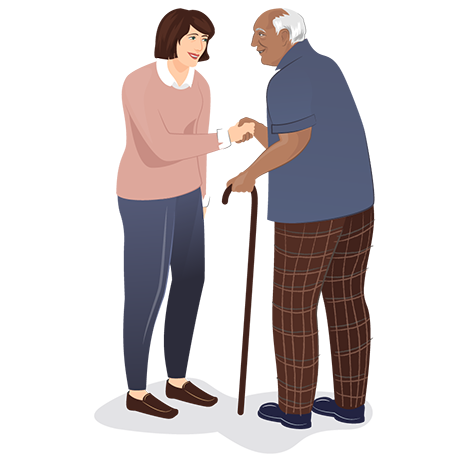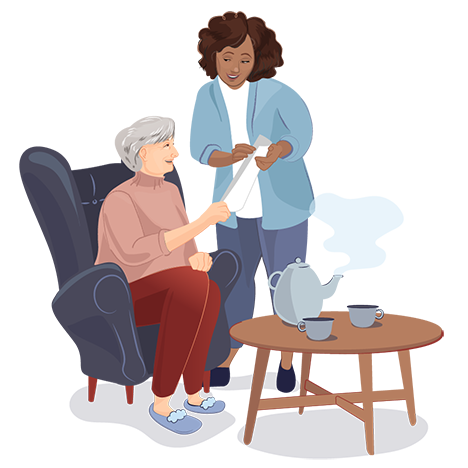
Live in Care for Young Adults: A Guide
What is live-in care for young adults, and is it right for your loved one? Read this guide from Live in Care Company specialists to discover how live-in care for younger adults can help navigate day-to-day tasks, social situations, and routines, and support independent life as much as possible.



Speak to one of our experts
Our friendly experts are here to help from 9am to 7pm, 7 days a week.
This guide will cover the following:
- What is live-in care for young adults?
- Who needs young adult live-in care?
- Health conditions and young adult live-in care
- How can live-in care for young adults help?
- Why choose live-in care over a care home?
- Benefits of live-in care for young adults
- Young live-in care costs
- How to arrange live-in care for young adults
- Why choose the Live in Care Company for young adults
What is live in care for young adults?
Live-in care is a personalised form of care for your loved ones within the comfort of their own home. Live-in care for young adults can be incredibly helpful for those struggling with specific conditions and issues such as cerebral palsy, spinal injury, brain injury, strokes, motor neurone disease and other neurological conditions. The individualised care that is provided by young adult live-in care can benefit many – from those in their twenties struggling with learning disabilities to people in their late forties living with brain or spinal cord injuries. The key factor that makes live- in care so popular is the fact that a young person can remain within the comfortable and familiar surroundings of their own home or family home and have control of when and how support is delivered. It is reassuring for parents, other relatives or friends to know that their loved one will be delivered in a friendly and individualised manner by experienced professional carers.
Live-in care for younger adults holds a stronger focus on independence by helping to ensure that your loved one is able to live their life to the fullest. They may do this by supporting their studies, work, social life, professional development, or self-care. The type of care your loved one will receive depends on their individual needs and goals and finding the right caregiver and care plan can make a huge impact on their overall quality of life. Live-in care for young adults can be long-term or short-term, be personalised for psychological issues, or be focused on different physical needs. A live-in carer can encourage young adults to achieve certain aims and aspirations or join supportive communities. Above all, a young adult’s live-in carer can be a constant companion and friend, an understanding and sympathetic presence during life’s most difficult moments.
Who needs young adult live-in care?
A younger person may benefit from the assistance of a live-in carer if they struggle with completing daily tasks on their own – such as bathing, getting dressed in the morning, cleaning, or cooking. If your loved one is able to achieve these forms of self-care on their own, they may still need assistance with other responsibilities and errands- such as preparing for the day, taking trips to the shop, or travelling to and from community events, school, or work.
Your loved one may benefit from live-in care for young adults if they:
- Have short or long-term physical impairments or conditions
- Struggle with behavioural issues
- Have a learning disability or issues with education
- Have issues with mental or emotional health – such as depression, schizophrenia, or PTSD
Young adult live-in care is a great option for those who need support but would be more comfortable in their own home. They may want to stay closer to family, avoid living in a residential home, or simply require extra care and assistance after an illness, injury, or surgery.
It’s also possible that your loved one was born with a disability and wants more independence now that they have become an adult. This can be a difficult stage for family members who have identified as their main caregivers for years. However, with live-in care, disabled young adults are able to have the independence they desire in a safe and supportive way.
Health conditions and young adult live-in care
There is a wide range of health issues, conditions, and disabilities that may affect younger adults and lead them to require the assistance of a live-in carer. Live-in care options can vary depending on the physical or mental disabilities of your loved one. They may need either a specialised and focused form of care or a more hands-off approach.
The most common conditions that younger adults may struggle with include:
- Developmental disorders – such as Cerebral Palsy, learning disabilities, Autism Spectrum Disorders, or Down Syndrome
- Parkinson’s Disease
- Multiple Sclerosis
- Accident-related injuries that cause permanent disability
- Injuries affecting the spinal cord or brain
- Motor Neurone Disease
- Mental health issues
- Early-onset Alzheimer’s disease (Affecting people in their 40s and 50s)
- Stroke
- Heart attack or heart issues
- Blindness and hearing impairment
The comfort, support, and security of a live-in carer can be incredibly helpful. A difficult diagnosis can be trying for both the young person and their family. However, the help of a dedicated and trusted live-in carer can make all of the difference.
How can live-in care for young adults help?
Live-in care can have an incredible effect on the lives of younger, disabled adults who want to live a full and independent life. Remaining in their own residence provides flexibility and great peace of mind as leaving home can be straining and mentally stressful.
A young adult live-in carer can provide different forms of care depending on a person’s unique needs and requirements. They can help with tasks around the house, like cleaning or cooking, or they may provide more clinical aid. For example, a live-in carer can be a registered nurse or someone who is qualified with the skills and experience needed to attend to your loved one’s unique health conditions.
Having a live-in carer stay with your loved one around the clock can create a secure environment where they can flourish independently and continue to pursue their favourite activities, social life, studies, or work as they would like to.
What types of care are offered in live-in care for young adults?
A dedicated live-in carer can transform your loved one’s life by providing support in a number of different ways. At the Live in Care Company, we offer different types of care such as personal care, 24-hour care at home, domiciliary services, palliative care, respite care, and more.
Personal care
A personal carer will assist your loved one with hygiene, health, and overall self-care. They may help with bathing and showering, dressing and getting ready for the day, or assist with hair care and brushing their teeth.
Common tasks a personal carer can help your loved one with include:
- Assistance with mobility
- Help with applying makeup or other beauty products
- Assist with shaving
- Offer nutritional advice
- Help with showering and bathing
- Or offer specialised clinical care
Physical appearance and the way a young person presents themself to their social circles is very important. The help of a personal carer can be transformative to the lives of young adults with developmental issues such as Autism or ones with physical impairments that keep them from independently showering, shaving, or fixing their hair.
24- hour care at home
Having a live-in carer stay with your loved one overnight can help both you and them feel comfortable living in a residence of their own. A 24-hour carer will stay the night and be available to assist your loved one during the darkest hours.
This kind of overnight care can provide great peace of mind, a sense of security, and comfort. These carers may help your loved one use the toilet, take medicine, or assist with complex care need such as ventilators or catheters. The amount of care offered will be perfectly tailored to your loved one’s needs and abilities.
Domiciliary services
A domiciliary carer’s main goal is to help with domestic tasks and provide care within the home. It’s possible your loved one can live a much more independent life in a residence of their own with the support of a domiciliary carer for young adults. The duties are similar to the services of a domiciliary carer for the elderly.
Some tasks that they may help with include:
- Going to the shop
- Cooking nutritious and tasty meals that consider your loved one’s preferences and any dietary restrictions
- Cleaning, tidying, and doing the laundry
- Arranging trips out to community events
- Taking care of any pets by feeding them and walking them
- Offering transportation to doctor appointments, classes, work, or to see friends and family
- Completing life-administration tasks such as keeping on top of bills, doctor appointments, and general admin
Palliative care
A palliative carer is specialised in providing comfort and in mitigating suffering among those who are struggling with complex, serious, or terminal illnesses. They can provide medical care and work to boost the overall quality of life by creating a safe, comfortable, and familiar environment.
Palliative care will vary depending on the person being cared for and their unique condition. However, younger adults at the end of their life are more likely to struggle with mental and emotional pain as well as physical. The loss of control over their future can be difficult to manage, especially if they compare themselves to other young people moving forward with their lives. Care will centre around creating a positive mindset and ensuring that the individual being cared for is completely supported in a compassionate and empathetic way.
Respite care
It’s also possible for care to be extended to the family of disabled young adults in the form of respite care. This is when a temporary live-in carer offers main caretakers a break or a rest so that they can look after themselves. They may visit to take over personal care duties, assist with eating and drinking, or simply provide companionship.
Why choose live-in care over a care home?
Many individuals, regardless of age, prefer live-in care to moving into a care home. Being able to stay within your own house and avoiding the upheaval of change is reason alone to invite a carer into your own residence. However, for younger people, there are more serious reasons to avoid the care home until later in life.
Care homes can be a particularly difficult environment for younger people. Young adults have completely different social and psychological needs compared to elderly patients, and living in a space that is geared toward older adults can negatively impact both the mental health and quality of life of younger people.
Young live-in care is a much more appropriate option for those under the age of 50. By staying in their home, they are given much more flexibility, and they can have much more control over how their time is spent. Life can be lived as normally as possible while being supported with the help of a professional. They are able to keep their pets and continue to maintain their relationships, hobbies, or regular activities.
A personalised care plan is created to provide young adults with a roadmap outlining the way a live-in carer will support their safety, mental health, physical health, social life, and overall well-being. See our guide to creating a care plan for a better idea of how live-in care can support your loved one.
What are the benefits of live-in care for young adults?
The main advantage of live-in care is the amount of independence that a young person can gain through a carer’s support. However, the benefits of live-in care can reach into almost every aspect of a person’s life – seen physically, mentally, emotionally, socially, and overall well-being.
Physical benefits
There are numerous physical benefits to live-in care for younger people. A young person can hugely benefit from a tailored care plan that incorporates as active a lifestyle as possible. Options might include attending physiotherapy, or involvement in sports clubs with assistance from a carer. Trying new hobbies and spending time outside can become easier and more accessible with a live in carer, with a reassurance for family members that their loved one is accompanied by a capable and caring pair of hands.
Physical health will is boosted and closely looked after with a young adult live-in carer. They can put a great emphasis on cooking nutritious meals, watching out for dietary restrictions or requirements, and keeping the brain active through games, conversation, or interaction.
A tailored care plan can also consider all aspects of health, from physical exercise to nutrition; meal plans and dietary advice can transform a young person’s diet for the better. A young live in carer can ascertain and establish the best possible meal plan and create exciting, delicious food for your loved one on a daily basis if required.
Mental benefits
A happy and healthy lifestyle is one that encourages independence, learning and companionship, all of which are possible with a live-in carer. As well as helping with physical day-to-day tasks, a live-in carer is a perfect companion, making sure your loved one is not alone or unstimulated, which can lead to increased feelings of anxiety or depression. It can be very reassuring for both your family and the client to have a live-in carer by your side.
Social benefits
Occasionally there are limitations with social activities for those who may be living with physical or psychological conditions. For example, they may be unable to clean and prepare the house for guests or be able to transport themselves to different social events. A young adult live-in carer will be able to provide the right support and help an individual prepare for an outing or visitors. Days out and trips out are a great way to form new relationships within a community, too, and a live-in carer can find the right kind of outings suitable for their client.
Live in care costs
See our guide to live-in care for hourly and daily rates as well as a live-in care cost calculator. You can also check out our live-in care cost guide for more information on cost-effective options. However, keep in mind that live-in care prices can vary depending on the type and level of care you require.
How to arrange live in care for young adults
You can arrange live-in care for young adults in a couple of ways. One way is to do your own research and find a carer on your own. For some, this option may be stressful, so you’ll be pleased to know there are alternatives such as trusted professional services that can conduct the research for you. A live-in care agency can take on the stress for you and carefully vet potential carers, carrying out necessary background checks before finding the perfect live-in carer for you.
Why choose the Live in Care Company for young adults
Here at the Live in Care Company, we believe that the right carer can make all the difference for your loved one’s happiness and ability to succeed. A live-in carer can support them to live the best life possible, and we are dedicated to finding the perfect match between our clients and their carers while taking in their preferences and guidance from the family.
We use an individualised approach, create personal and unique care plans, and help you select a carer that will best meet your needs. For a closer look into the Live in Care Company process, see our short guide on how it works.
Find out more about our experienced and friendly care team and our specialised services here. If you are unsure if young adult live-in care is best for your loved one, get in touch with us, we would love to speak with you and answer any of your questions









